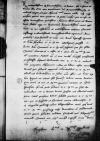Fui a puero et tenera illa aetate mea Dominationis Vestrae Reverendissimae ita, ut nullius magis, semper observandissimus, verum nulla u text damaged⌈[u]u text damaged⌉mquam mihi praestari potuit tam opportuna et grata occasio, qua re ipsa et effectu demonstrare potuissem sincerum illud meum et benevolens studium erga Vestram Dominationem Reverendissimam. Cuius optimam in me affectionem et candidissimum animum plurimis eisdem evidentissimis demonstrationibus cognoveram, donec pridie e contubernali et amico meo domino Wojciech Kijewski (Wojciech Kijowski, Wojciech Kilewski, Albert Kijowski) (*ca. 1495 – †1566), from 1518 scribe in the royal chancellery; 1531-1535 secretary to Vice-Chancellor Piotr Tomicki; from 1532 Dean of the Collegiate Chapter in Sącz; from 1523 Canon of Kulm (Chełmno); from 1532 Canon of Ermland (Warmia); from 1533 Canon of Włocławek; from 1547 Canon of Cracow; representative of the Ermland Church at the royal court (KOPICZKO 2, p. 147; SBKW, p. 112-113)⌊KyewskyWojciech Kijewski (Wojciech Kijowski, Wojciech Kilewski, Albert Kijowski) (*ca. 1495 – †1566), from 1518 scribe in the royal chancellery; 1531-1535 secretary to Vice-Chancellor Piotr Tomicki; from 1532 Dean of the Collegiate Chapter in Sącz; from 1523 Canon of Kulm (Chełmno); from 1532 Canon of Ermland (Warmia); from 1533 Canon of Włocławek; from 1547 Canon of Cracow; representative of the Ermland Church at the royal court (KOPICZKO 2, p. 147; SBKW, p. 112-113)⌋, canonico et bono servitore Vestrae Dominationis Reverendissimae intelligens petiisse a Piotr Tomicki (*1464 – †1535), humanist, statesman, diplomat, one of the most trusted collaborators of King Sigismund I of Poland; 1500-1503 Chancellor of Cardinal Fryderyk Jagiellon, 1502 Gniezno Cantor, Archdeacon of Cracow, 1503-1505 servant of Jan Lubrański, Bishop of Poznań, 1504-1510 Canon of Poznań, 1506 royal scribe, 1507-1519 Grand(?) Secretary, 1509 Canon of Włocławek, 1510-1514 - of Gniezno, 1511 Custos in Kielce and Sandomierz, 1514 Bishop of Przemyśl; 1515 Crown Vice-Chancellor, 1520 Bishop of Poznań, 1523 - of Cracow; from 1524 (at least) General Collector of świętopietrze (Peter's pence), 1509 royal envoy to the Dukes of Pomerania and to Mecklenburg, 1510 - to Wallachia, 1510, 1511, 1512, 1513 - to Hungary (WYCZAŃSKI 1990, p. 268)⌊reverendissimo domino CracoviensiPiotr Tomicki (*1464 – †1535), humanist, statesman, diplomat, one of the most trusted collaborators of King Sigismund I of Poland; 1500-1503 Chancellor of Cardinal Fryderyk Jagiellon, 1502 Gniezno Cantor, Archdeacon of Cracow, 1503-1505 servant of Jan Lubrański, Bishop of Poznań, 1504-1510 Canon of Poznań, 1506 royal scribe, 1507-1519 Grand(?) Secretary, 1509 Canon of Włocławek, 1510-1514 - of Gniezno, 1511 Custos in Kielce and Sandomierz, 1514 Bishop of Przemyśl; 1515 Crown Vice-Chancellor, 1520 Bishop of Poznań, 1523 - of Cracow; from 1524 (at least) General Collector of świętopietrze (Peter's pence), 1509 royal envoy to the Dukes of Pomerania and to Mecklenburg, 1510 - to Wallachia, 1510, 1511, 1512, 1513 - to Hungary (WYCZAŃSKI 1990, p. 268)⌋ Dominationem Vestram Reverendissimam hospitium pro suo felici Cracow (Kraków, Cracovia), city in southern Poland, Małopolska, on the Vistula river, from 1038 capital of the Kingdom of Poland⌊CracoviamCracow (Kraków, Cracovia), city in southern Poland, Małopolska, on the Vistula river, from 1038 capital of the Kingdom of Poland⌋ adventu et a castro et a curia suae dominationis reverendissimae non remotum, ratus mihi et iam tandem nonnihil occasiunculae praestitisse superos declarandae meae in Vestram Reverendissimam Dominationem veteris immo perpetuae observantiae, ultro et libere usum meae domus pro futuris nuptiarum[1] solemnitatibus Dominationi Vestrae Reverendissimae obtuli et libentissimo ac hilari animo offero, et licet vix
cf. Vulg. Lc 7:6; Vulg. Mt 8:8 ⌊sum dignus, ut intres sub humile tectum meumcf. Vulg. Lc 7:6; Vulg. Mt 8:8 ⌋, domine. Quia tamen et arci et Piotr Tomicki (*1464 – †1535), humanist, statesman, diplomat, one of the most trusted collaborators of King Sigismund I of Poland; 1500-1503 Chancellor of Cardinal Fryderyk Jagiellon, 1502 Gniezno Cantor, Archdeacon of Cracow, 1503-1505 servant of Jan Lubrański, Bishop of Poznań, 1504-1510 Canon of Poznań, 1506 royal scribe, 1507-1519 Grand(?) Secretary, 1509 Canon of Włocławek, 1510-1514 - of Gniezno, 1511 Custos in Kielce and Sandomierz, 1514 Bishop of Przemyśl; 1515 Crown Vice-Chancellor, 1520 Bishop of Poznań, 1523 - of Cracow; from 1524 (at least) General Collector of świętopietrze (Peter's pence), 1509 royal envoy to the Dukes of Pomerania and to Mecklenburg, 1510 - to Wallachia, 1510, 1511, 1512, 1513 - to Hungary (WYCZAŃSKI 1990, p. 268)⌊reverendissimo CracoviensiPiotr Tomicki (*1464 – †1535), humanist, statesman, diplomat, one of the most trusted collaborators of King Sigismund I of Poland; 1500-1503 Chancellor of Cardinal Fryderyk Jagiellon, 1502 Gniezno Cantor, Archdeacon of Cracow, 1503-1505 servant of Jan Lubrański, Bishop of Poznań, 1504-1510 Canon of Poznań, 1506 royal scribe, 1507-1519 Grand(?) Secretary, 1509 Canon of Włocławek, 1510-1514 - of Gniezno, 1511 Custos in Kielce and Sandomierz, 1514 Bishop of Przemyśl; 1515 Crown Vice-Chancellor, 1520 Bishop of Poznań, 1523 - of Cracow; from 1524 (at least) General Collector of świętopietrze (Peter's pence), 1509 royal envoy to the Dukes of Pomerania and to Mecklenburg, 1510 - to Wallachia, 1510, 1511, 1512, 1513 - to Hungary (WYCZAŃSKI 1990, p. 268)⌋ vicinum et satis spatiosum est, non puto futurum Dominationi Vestrae Reverendissimae et suis ita incommodum, ut ei domum domini Hechler aut alterius cuiuspiam civis praeferre debeat. Habebit praeterea Dominatio Vestra Reverendissima me, qui et hospitis et servitoris munia obiturus sum et in singulis quibusque rebus diligentissime morem ges<t>urus Dominationi Vestrae Reverendissimae, quascumque mihi demandare non dubitaverit. Cuius gratiae feliciter valiturae servitutem meam diligentissime commendo.


 BCz, 243, p. 30
BCz, 243, p. 30